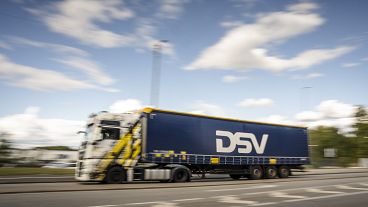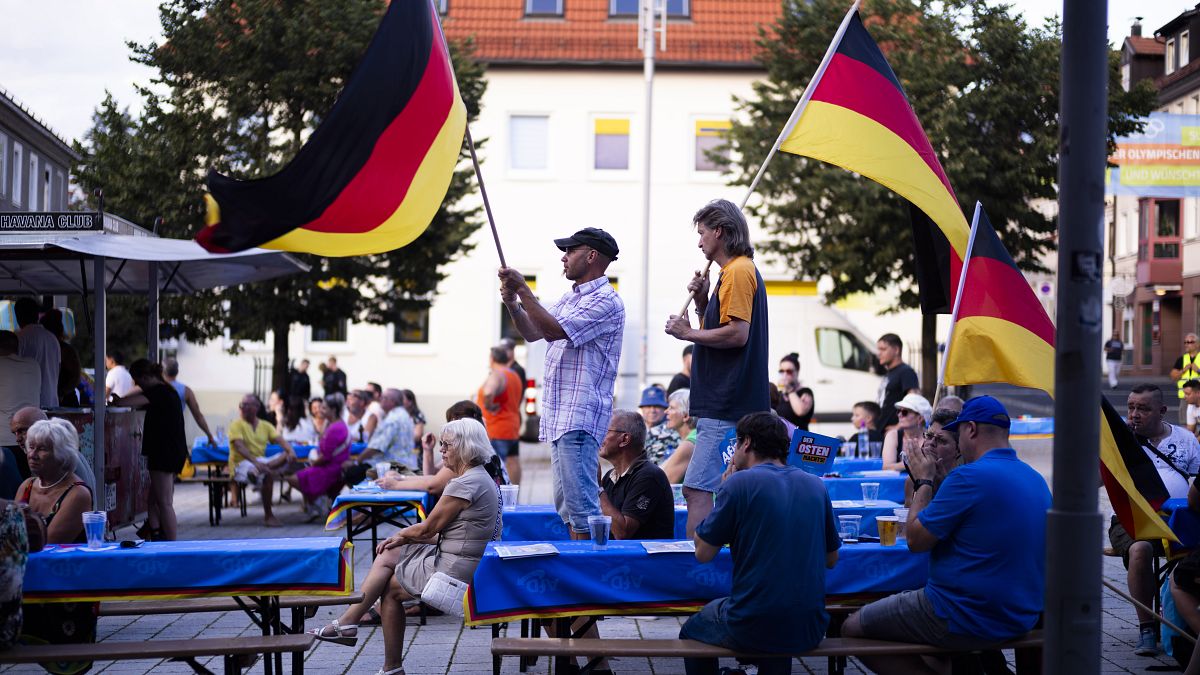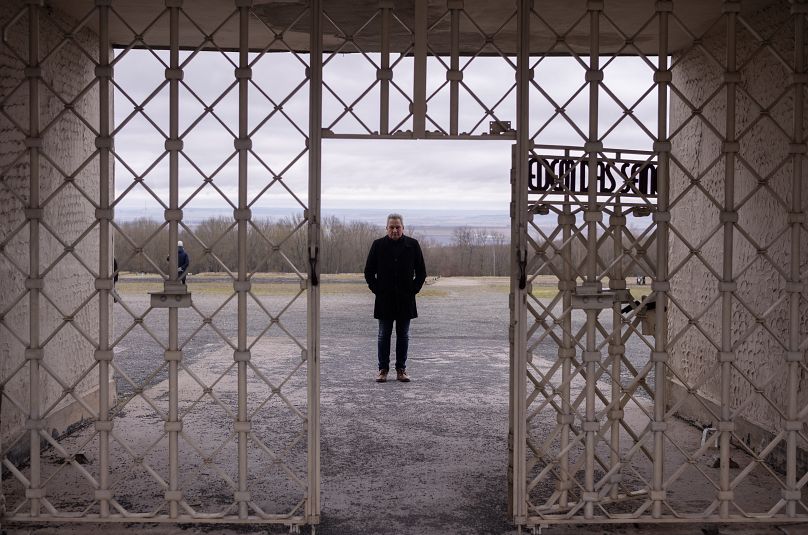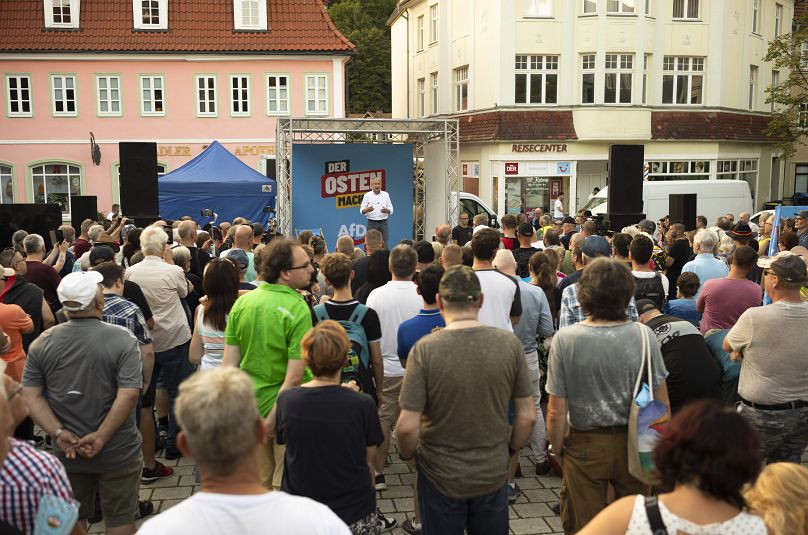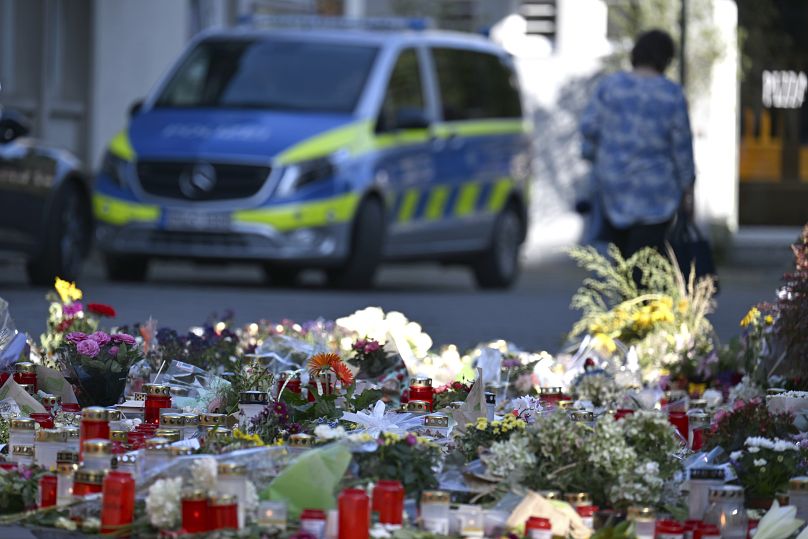In Thuringia, which has a population of 2.1 million and where the famous Buchenwald concentration camp memorial is located, the fiercely anti-immigration AfD is leading with 30% in the polls for the upcoming 1 September state elections.
Three eastern German states of Thuringia, Saxony, and Brandenburg are set to elect new parliaments next month, and in all three states the far-right Alternative for Germany, or AfD, is ahead in the polls.
In Thuringia, which has a population of 2.1 million and where the famous Buchenwald memorial is located, the fiercely anti-immigration AfD is leading with 30% in the polls, ahead of the 1 September elections.
That figure is way ahead of the centre-right Christian Democrats (CDU), who were in power for 16 years under former Chancellor Angela Merkel. The CDU is currently polling at 21% in the state.
Faced with the far-right's potential win in the regional elections, experts say there are reasons for Germany's federal government to be afraid for the future, especially the parties that make up Chancellor Olaf Scholz's centre-left bloc.
AfD seen as a 'threat'
Germany's security service has labelled the Thuringian AfD as a right-wing extremist party. The AfD leader in the state, Björn Höcke, was convicted twice for using the banned Nazi slogan 'Alles für Deutschland' ('Everything for Germany').
The party's current election manifesto carries the slogan 'Alles für Thüringen' ('Everything for Thüringen') which has sparked a wave of concern among many, including Jens-Christian Wagner, the director of the Buchenwald Memorial which commemorates the victims of the Nazi concentration camp of the same name.
Wagner is even more worried about the success of the radical and extreme right in Germany following its strong record in the recent European election.
He believes that relativising Nazism is part of AfD's "ideological core", and that the Buchenwald Memorial may not survive if the party wins the vote, because it could then intervene in the memorial's management.
"The AfD claims that the work we do here, the culture of remembrance, is a so-called 'culture of guilt'," Wagner said. "And according to that idea, I am the preacher of this culture of guilt. And of course, I therefore have to go."
During World War II, the Nazis held some 277,000 people at Buchenwald, around 56,000 of whom died.
After US troops liberated the camp, the inhabitants of the nearby city of Weimar were forced to visit. The expression "Wir haben es nicht gewußt" is attributed to their reaction: they claimed they had not noticed.
This time many are trying to sound the alarm so that people do notice. Wagner sees it as his duty to warn against the radical right and the trivialisation of the Holocaust, making him one of the most important voices against the AfD.
"[It is frustrating] that despite our work, teaching history and politics, at the moment about 30% of the people in Thuringia are prepared to vote for the AfD," he said. "But of course that cannot make us give up."
Many seem undeterred
At an AfD rally in Neustadt an der Orla, attendees were not impressed by Wagner's warnings.
"What has always bothered me is that they always say: 'Germany started the two world wars'. That is not true," a woman attending the rally said.
“Yes, that was indeed part of our history. But not only Germany committed crimes, did it?" she added.
Thuringian AfD leader Björn Höcke, 52, was one of the speakers. He told the crowd, "Germans need normal patriotism again. A lively patriotism," he said.
"We have been portrayed as a kind of pariah in history for 80 years now," he said. "This cannot continue. The Germans must learn to become friends with themselves again. And that too is the mission of the AfD."
At the campaign rally, the belief was that the AfD would change this, albeit led by the man who was recently convicted for repeating Nazi slogans in his speeches.
However noble the plan, the records tell a different tale, and analysts say that specifically in Thuringia, radical far-right forces have created an environment that's hostile toward minorities, including black people.
Migration and foreign policy
In 2023, the NGO Ezra, which helps victims of far-right, racist, and antisemitic violence, documented 85 racist attacks in Thuringia, down only slightly from 88 attacks in 2022.
Ezra described this as "an all-time high of right-wing and racist violence" in the state.
"In recent years, an extreme right-wing movement has formed in Thuringia, which has contributed to a noticeable ideological radicalisation of its followers. Politically, the Alternative for Germany party is the main beneficiary," Ezra and a consortium of organisations tracking racism wrote in their annual report.
Some companies in eastern Germany have also said they are finding it increasingly hard to attract the skilled foreign workers they desperately need as the far-right AfD gains more power.
A recent poll of more than 900 German companies by the Institute for the German Economy also showed that a majority sees the AfD as a risk, both for securing skilled workers and for investment in the region.
Last year, businesses and individuals set up Cosmopolitan Thuringia, a grassroots network to promote tolerance, diversity, and "indivisible human rights," which now has more than 7,940 members.
In particular, the AfD's Thuringia branch was put under official surveillance by the domestic intelligence service four years ago as a "proven right-wing extremist" group.
All three German eastern states — Thüringia, Saxony, and Brandenburg — account for 10% of Germany's population, and their election results are expected to have a major influence on national politics and foreign policy.
One of the topics on foreign policy is the war in Ukraine, and alongside that, the issue of migration. Both far-left and far-right parties are demanding negotiations with Russia and the halting of weapons deliveries to Ukraine.
A new far-left party, the Sahra Wagenknecht Alliance (BSW), splintered from left-wing party Die Linke last year, wants negotiations with Russian President Vladimir Putin, the end of weapons deliveries to Ukraine, and the watering down of climate policies.
Poling at 20% in Thuringia and over 10% in Saxony, the new populist leftwing upstart led by Sahra Wagenknecht, an almost most cult-like figure in eastern Germany, is highly critical of the current government but hasn't offered many feasible solutions.
There is also the issue of migration, on which Olaf Scholz's SPD coalition government has been put under pressure, more so since Friday's attack in Solingen, involving a suspected extremist from Syria.
Solingen knife attack sparks debate
The stabbing spree left three people dead and eight others injured, four of them critically, in the western city.
Days later, the leader of the centre-right opposition CDU, Friedrich Merz, said he anticipates working with Chancellor Olaf Scholz to tighten immigration policies.
Merz called for concrete measures to curb irregular migration and urged Scholz's centre-left Social Democrats to cooperate with the CDU on the subject.
The suspect in the Solligen attack, a 26-year-old Syrian male who has been placed under arrest, was meant to be sent to Bulgaria last year after his asylum application was turned down in Germany.
To keep the AfD out of power, a potential alliance between parties will have to happen, potentially between the BSW and CDU, something that is almost inconceivable with divergent standpoints on several issues.
With elections scheduled for 1 September and 22 September, respectively, the AfD is also quite powerful in the states of Saxony and Brandenburg. However, in Saxony, the CDU is fighting back.
Possible alliance to stave off AfD?
They are currently tied with the AfD at about 30%, while Scholz's SPD coalition is hovering around 5% in opinion polls in both Saxony and Thuringia, the required threshold to have any representation in government.
Eastern Germany is widely perceived to be a homogenous region, but there are significant political disparities among the states.
In the past ten years, the socialist Left Party led by State Premier Bodo Ramelow has governed Thuringia, while since 2017, Michael Kretschmer of the centre-right CDU has been in charge of Saxony.
Dr. Carsten Koschmieder, political analyst at the Free University in Berlin, expects the AfD to be the strongest party, at least in Saxony. But it is unlikely that it will win over the 50% needed for a majority to join the government.
Since the end of World War II, an outright majority has been exceedingly rare in Germany, a system designed to curb the rise of an extremist to power.
As such, leading parties must usually form coalitions to govern, and appointing judges requires a two-thirds majority.
However, even if the AfD doesn't enter government, it can still exert great influence, according to Koschmieder.
Whilst the CDU has ruled out forming a coalition with AfD on both local and federal levels, they could potentially backtrack on this promise. Analysts have said both parties have more in common than what sets them apart.
If there is any party to lose, that will be the Social Democrats of Chancellor Scholz and its fractious coalition with the Green Party and the neoliberal Free Democrats (FDP).
Scholz has set the next national election for 28 September 2025, but first, he'd have to see the outcome of the eastern elections this September to know where Germany's political dimension is headed.


